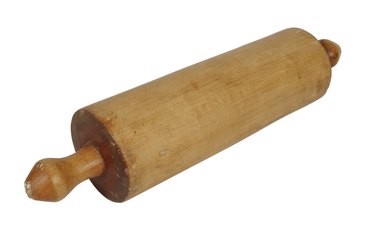
Whether a marble or wood rolling pin is best depends on two things, the dough and the baker. All rolling pins are cylinders and most have handles at either end that operate on ball bearings.
Marble Pins
Video of the Day
Susan Reid, editor of the baking newsletter for King Arthur Flour, a Vermont company, noted that marble pins are distinctly cooler than wood. They excel when butter is being incorporated into dough, as in puff pastry. Also, they are easy to use and will suit any baking purpose. More expensive marble pins may have handles of exotic woods.
Video of the Day
Wooden Pins
Wooden pins are usually maple but designer woods may be used. A New York firm offers handmade heirloom quality wooden pins that are art objects in addition to serving a useful function. Wood's main disadvantage is that it can become sticky. Reid places her dough on a large sheet of parchment paper, covers it with a plastic storage bag and rolls the dough through the plastic, no flour needed.
Useful Functions
With either marble or wood, the weight of the pin and pressure from the cook are usually enough to flatten the heaviest of doughs. Because nearly all rolling pins have a 10-inch barrel and 3-inch handles on each side, a cook has two handy measurements available when rolling dough into a flat sheet, Reid says.
French pins
French rolling pins have thinner cylinders that taper at each end and have no handles. Some bakers prefer them for rolling dough extra thin. The tapered ends are useful for dough like pot stickers where the ends are thinner than the middle.
New Options
Today's baker has many more choices of rolling pins. Silicone and non-stick pins are popular, and other choices include stainless steel, plastic, glass or other materials. One specialty store offers a pin made of polyamide plastic that is said to be perfect for rolling French pastry.